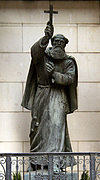- Marco d'Aviano
-
Marco d'Aviano 
Marco d'AvianoBlessed Born 1631
Aviano, VeniceDied 1699 Beatified 2003 by John Paul II Feast August 13 Marco d'Aviano (1631–1699) was a Capuchin friar. His real name was Carlo Domenico Cristofori, his birthplace Aviano, a small community in the Republic of Venice (Italy). From an early age, he felt attracted to a life of devotion and martyrdom. Educated at the Jesuit College in Gorizia, at 16 he tried to reach the island of Crete, where the Venetians were at war with the Ottoman Turks, in order to preach the Gospel and convert the Muslims to Christianity. On his way, he sought asylum at a Capuchin convent in Capodistria, where he was welcomed by the Superior, who knew his family, and who, after providing him with food and rest, advised him to return home.
Inspired by his encounter with the Capuchins, he felt that God was calling on him to enter their Order. In 1648, he began his novitiate. A year later, he professed his vows and took his father's name, Marco, becoming Fra' Marco d'Aviano. His ministry entered a new phase in 1664, when he received the licence to preach throughout the Republic of Venice and other Italian states, particularly during Advent and Lent. He was also given more responsibility when he was elected Superior of the convents of Belluno in 1672, and Oderzo in 1674.
His life took an unexpected turn in 1676, when he gave his blessing to a nun, bedridden for some 13 years: she was miraculously healed. The news spread far and wide, and it was not long before the sick, and many others from all social strata, began to seek him out.
Among those who sought his help was Leopold I, Holy Roman Emperor, whose wife had been unable to conceive a male heir. From 1680 to the end of his life, Marco d'Aviano became a close confidant and adviser to him, providing the irresolute and often indecisive emperor with guidance and advice for all problems, political, economic, military or spiritual. His forceful, energetic and sometimes passionate and fiery personality proved a good complement for Leopold's Hamlet-like tendency to allow endless doubts and scruples to paralyse his capacity for action. As the danger of war with the Ottoman Turks grew near, Marco d'Aviano was appointed by Pope Innocent XI as his personal envoy to the Emperor. An impassioned preacher and a skillful mediator, Marco d'Aviano played a crucial role in resolving disputes, restoring unity, and energizing the armies of the so-called 'Holy League,' which included Austria, Poland, Venice, and the Papal States under the leadership of the Polish king Jan III Sobieski. In the decisive Battle of Vienna (1683), the Holy League succeeded in inflicting a decisive defeat on the invading Ottoman Turks. This marked the end of the last Turkish attempt to expand their power in Europe, and the beginning of the long European counter-offensive that was to continue ultimately until the disintegration of the Ottoman empire in 1918. This may therefore be considered one of the decisive battles of history. It also put an end to the period of Ottoman revival under the Koprulu Grand Vizirs and their protegé and successor, Kara Mustapha, who was in command of the Ottoman army at Vienna.
From 1683 to 1689 he participated in the military campaigns in the role of promoting good relations within the Imperial army and to help the soldiers spiritually. His assistance helped to bring about the liberation of Buda in 1686 and Belgrade in 1688. At the same time, he always maintained a strictly religious spirit, to which any needless violence and cruelty were repugnant. As a result, at the siege of Belgrade several hundred Muslim soldiers successfully appealed to him personally, in order to avoid being massacred upon capture.
In the judgement of historians, Marco's influence over Leopold was exercised responsibly, in the sole interests of Christianity and of the House of Austria. In one of his private letters to the Emperor, Marco actually scolds him quite forcefully for granting a benefit to one of his brothers, reminding him that, by so doing, he was only providing ammunition for the enemies of their cause.
In 2003, he was beatified by Pope John Paul II.[1]
Trivia
A popular myth concerning d'Aviano says that he invented the Cappuccino after the Battle of Vienna.[2] No mention of this occurs in any of d'Aviano's biographies or in any contemporary historical sources. Indeed, the story does not appear until the late 1980s, which indicates that it was possibly made up as a joke.
External links
References
Categories:- 1631 births
- 1699 deaths
- People from the Province of Pordenone
- Beatified people
- Capuchins
- 17th-century venerated Christians
Wikimedia Foundation. 2010.
